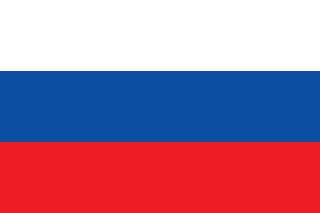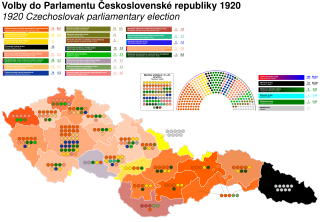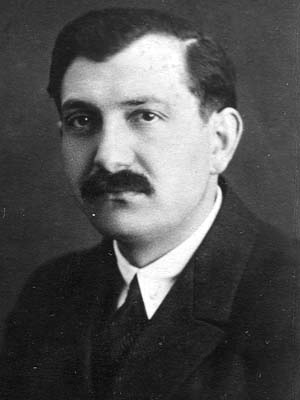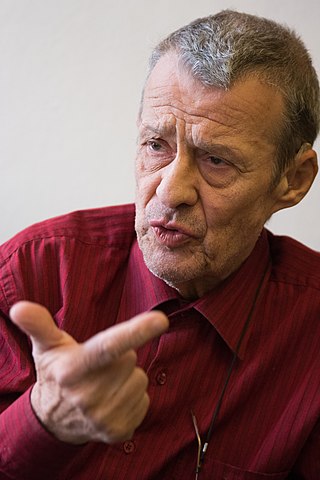
The Slovak Socialist Republic was a republic within the Czechoslovak Socialist Republic from 1969 to 1990, when the previously unitary Czechoslovak state changed into a federation. The name was used from 1 January 1969 until November 1989. The Slovak Republic was, from 1990 to 1992, a republic within the Czech and Slovak Federative Republic, that is now the independent Slovakia.

The Federal Assembly was the highest organ of state power of Czechoslovakia from 1 January 1969 until the amendment of the state constitution on 23 April 1990. From 23 April 1990 until the dissolution of Czechoslovakia on 31 December 1992, it functioned as the state's federal legislature.
Parliamentary elections were held in Czechoslovakia on 26 May 1946. The Communist Party of Czechoslovakia emerged as the largest party, winning 114 of the 300 seats with 38% of the vote. The Communist vote share was higher than any party had ever achieved in a Czechoslovak parliamentary election; previously, no party had ever won more than 25%. Voter turnout was 94%. The national results also determined the composition of the Slovak National Council and local committees.

Parliamentary elections were held in Czechoslovakia on 18 and 25 April 1920. Members of the Chamber of Deputies were elected on 18 April and members of the Senate on 25 April. The elections had initially been planned for mid- or late 1919, but had been postponed.

Parliamentary elections were held in Russia on 12 December 1993. They were the first parliamentary elections in post-Soviet Russia and the only time to the Federation Council, with future members appointed by provincial legislatures and governors.

Bohumil Jílek was a Czechoslovak politician.

Parliamentary elections were held in Bulgaria on 8 June 1986. The Fatherland Front, dominated by the Bulgarian Communist Party, was the only organization to contest the election; all candidate lists had to be approved by the Front. The Front nominated one candidate for each constituency. Of the 400 candidates 276 were members of the Communist Party, 99 were members of the Bulgarian Agrarian National Union and the remaining 25 were unaffiliated. Voter turnout was reportedly 99.5%.

Parliamentary elections were held in Bulgaria on 7 June 1981. The Fatherland Front, dominated by the Bulgarian Communist Party, was the only organisation to contest the election; all candidate lists had to be approved by the Front. The Front nominated one candidate for each constituency. Of the 400 candidates 271 were members of the Communist Party, 99 were members of the Bulgarian Agrarian National Union and the remaining 30 were unaffiliated. Voter turnout was reportedly 99.9%.

Parliamentary elections were held in Czechoslovakia on 26 and 27 November 1971. They were the first held after the Constitutional Act on the Czechoslovak Federation converted Czechoslovakia into a federal republic, comprising the Czech Socialist Republic and the Slovak Socialist Republic, as well as the first elections in Czechoslovakia held in the aftermath of the Prague Spring.

Parliamentary elections were held in Czechoslovakia on 22 and 23 October 1976. The National Front put forward a single list of candidates for both the House of the People and the House of Nations and one NF candidate ran in each single member constituency. With a total of 350 seats in the two Houses, 237 were assigned to the Communist Party of Czechoslovakia, 18 to the Czechoslovak People's Party, 17 to the Czechoslovak Socialist Party, four to the Party of Slovak Revival and 74 to others. Voter turnout was reported to be 99.7%.

Parliamentary elections were held in Czechoslovakia on 23 and 24 May 1986. The National Front put forward a single list of candidates for both the House of the People and the House of Nations and one NF candidate ran in each single member constituency. With a total of 350 seats in the two Houses, 242 were assigned to the Communist Party of Czechoslovakia, 18 to the Czechoslovak People's Party, 18 to the Czechoslovak Socialist Party, four to the Party of Slovak Revival, four to the Freedom Party and 64 to independents. Voter turnout was reported to be 99.39%.

The Užhorod electoral district was a parliamentary constituency in Czechoslovakia for elections to the Chamber of Deputies and the Senate. The constituency covered all of Subcarpathian Ruthenia. The electoral district elected nine deputies in all elections held in the constituency during the First Czechoslovak Republic. The numbers of electors per each parliamentary seat was the highest in the Užhorod compared to all other electoral districts.

Parliamentary elections in the First Czechoslovak Republic were held in 1920, 1925, 1929 and 1935. The Czechoslovak National Assembly consisted of two chambers, the Chamber of Deputies and the Senate, both elected through universal suffrage. During the First Republic, many political parties struggled for political influence and only once did a single party muster a quarter of the national vote. Parties were generally set up along ethnic lines.

The Těšín electoral district was a parliamentary constituency in the First Czechoslovak Republic. It was set up ahead of the April 1920 parliamentary election in an area that both Czechoslovakia and Poland claimed as theirs. No vote was held there in 1920 and the constituency was abolished before the 1925 parliamentary election.

The Nové Zámky 16th electoral district was a parliamentary constituency in the First Czechoslovak Republic for elections to the Chamber of Deputies. The seat of the District Electoral Commission was in the town of Nové Zámky. The constituency elected 11 members of the Chamber of Deputies.

The Jihlava 10th electoral district was a parliamentary constituency in the First Czechoslovak Republic for elections to the Chamber of Deputies. The seat of the District Electoral Commission was in the town of Jihlava. The constituency elected 9 members of the Chamber of Deputies.

Petr Uhl was a Czech journalist, activist, and politician. A member of the Civic Forum, he served in the Federal Assembly of Czechoslovakia from 1990 to 1992. He was also a signatory of Charter 77.

The 1968 Czechoslovak presidential election took place on 30 March 1968. Ludvík Svoboda replaced Antonín Novotný as the President of Czechoslovakia. It was the only time during Communist regime that the elected president didn't receive 100% of votes.

Zdeněk Hoření was a Czechoslovak journalist who served as Editor-in-Chief of Rudé právo, the official newspaper of the Communist Party of Czechoslovakia.
Hana Sachsová was a Czechoslovak politician and educator who served as a member of both the National Assembly and the succeeding Federal Assembly. Outside of politics, she served as the director of a secondary general education school and published several books specializing in pedagogy.

















